
You are reading:

You are reading:
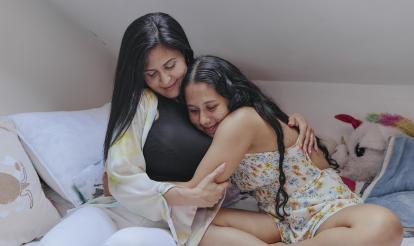
Bárbara and her mother, Dilcia were separated for a year and a half. Dilcia had migrated from Venezuela to Galicia in search of a better life, and when she found a job and a house, she was able to bring her children to Spain. Bárbara had to start from scratch: make new friends, learn Galician and go back to school. It was not easy, but thanks to the help of the Asociación Arela, coordinator of the CaixaProinfancia programme of the ”la Caixa” Foundation in Vigo, Bárbara received educational and psychological support to help her make a new start.
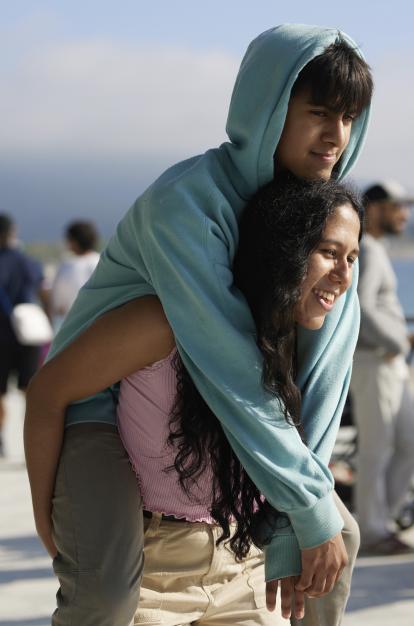
Dilcia’s arrival in Vigo paved the way for her and her two children: finding a job, a flat for the three of them to live in, schools... Today, together again, a photo album builds bridges with the people and experiences they left behind. “How cute,” says the mother when she sees a picture of her daughter at the age of three, “but what chubby cheeks!” Among these treasures from the past, they also discover the first ultrasound: “The moment I decided to call you Bárbara Andrea,” says the mother. Or the first day of pre-school. And a photo of a very young Bárbara eating a tangerine in her mother’s office. Now that she has passed her university entrance exam, the girl is fascinated to discover the stories in which she played the leading role without even being aware of it. Her mother, on the other hand, knows that this is the end of a phase. “So many memories, my love! If I’d known what it was like to be a mother, I wouldn’t have been afraid. Now I know I’ll always be with you.” Then, smiling, she warns: “I’ll continue to love you from beyond the grave, in the form of a ghost!” And Bárbara tries to comfort her: “But you’ll live for a thousand years, Mum!”
Sometimes Bárbara writes letters to the girl she used to be: so as not to lose the thread, because sometimes she gets scared and you have to talk to her and give her confidence. So she writes to the girl and says: “You wouldn’t believe what I’ve been through.” Leaving Venezuela at the age of 16 was a tough experience. She remembers how fearful she was, the mixed feelings. She couldn’t wait to be reunited with her mother, but was very sad to leave her grandmother, her friends, her cousins... Although they reassured her that she was going to a country with better opportunities, the future was a blank canvas and so much uncertainty made her heart shrink. “I was afraid that I wouldn’t fit in, that I wouldn’t make friends, that everything would be so different that I’d end up being overwhelmed.”
And at first, her worst fears seemed to be confirmed. It was her younger brother, Dereck, who had the hardest time adjusting to the new reality when he arrived in Spain. Because of the difference in the curriculum between the two countries, they both had to start in a lower class than their age group. But they also encountered difficulties they had not anticipated, such as a new language, Galician, and the food. “We missed the arepas.” And if the situation was already difficult, it became even more so when the pandemic hit and the family was confined to a small flat in Vigo. Always shut in. Not only Dereck, but also Bárbara began to have difficulty concentrating and, something that had never happened to her before, she started getting bad grades. In this context, they found people who helped them, thanks to the Asociación Arela, the coordinating body of the CaixaProinfancia programme of the ”la Caixa” Foundation in Vigo.
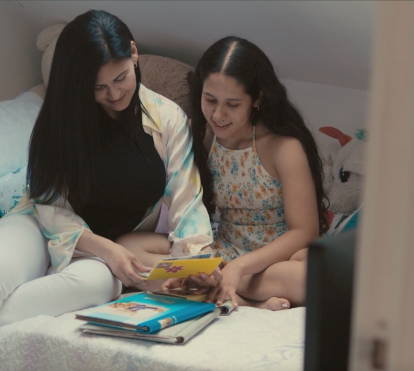
The mission of the CaixaProinfancia programme is to reverse the legacy of poverty and social exclusion that many children inherit, through education. To do this, it works in a network with more than 400 organisations that intervene directly in the area. The Asociación Arela focuses on neighbourhoods like Rivera Atienza, where it works with other organisations to provide educational support, summer camps, psychological help and family workshops, among other services. This is where Dereck and Bárbara found comprehensive assistance: reinforcement, open centre, camps and therapeutic care.
After failing two subjects in the summer, Bárbara enrolled in remedial classes. The urban camps for teenagers also helped her discover places in the city that she didn’t know about and allowed her to make friends. “If I made it to the university entrance exams, it was thanks to incredible people who believed in me when I had given up hope. They helped me to achieve my goals and not to feel alone. I made friends, I felt I was part of something. But above all, I know that I am who I am today thanks to the people who were and still are behind me, driving me forward.”
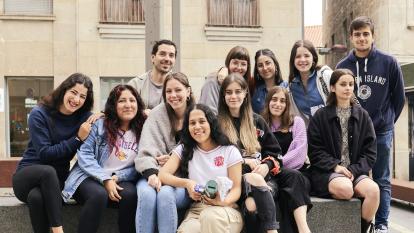
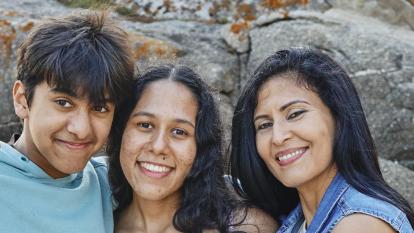
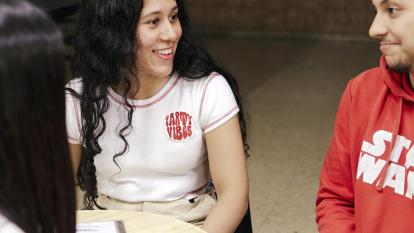
When Bárbara takes stock of her experiences, she likes to think positively. And so she returns to the letter she started some time ago: “I’ve discovered that sandwiches are as good as arepas, that there are people in Galicia who love me for who I am, and that it’s OK to cry when you feel frustrated.” And she concludes: “Life is about discovering your strength. And using it to never give up.”
Bárbara’s story is part of the documentary project Life stories, 14 stories of overcoming adversity which gives a voice to people at risk of exclusion who share their experiences in order to raise public awareness.